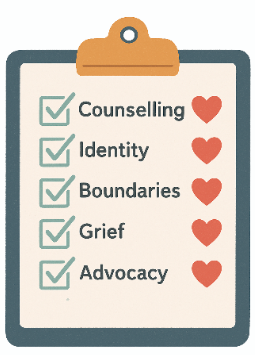They’re Struggling, and So Are You: Why moms of neurodivergent teens deserve a safe space too
- Nada Johnson

- Aug 5, 2025
- 4 min read
You do everything you can for your child.

You read the books.
You stay up late googling symptoms and strategies.
You pour your love into every appointment, every meltdown, every late-night worry.
But what happens when you’re the one who’s exhausted?
At Nada Johnson Consulting & Counselling Services (NJCCS), I work with mothers who are doing their absolute best to support a neurodivergent child, but feel completely invisible in the process.
Parenting a teen with ADHD, autism, or other neurodevelopmental challenges is often emotionally overwhelming, and yet mothers are rarely asked:
How are you doing?
The Invisible Weight Mothers Carry
When your child is struggling, all eyes are on them — the teachers, the therapists, the extended family. You become the coordinator, the cheerleader, the advocate, and the emotional sponge.
But in the quiet moments — after the meeting, after the meltdown, after the mask of “holding it all together” slips — you might feel:

🌧️ Guilt that you’re not doing enough
🌧️ Anger you don’t feel allowed to express
🌧️ Grief for the parenting journey you expected
🌧️ Fear about the future
🌧️ Deep, unspoken loneliness
These emotional responses are not uncommon. Research shows that mothers of children with neurodevelopmental disorders are significantly more likely to experience chronic stress, anxiety, and symptoms of depression than mothers of typically developing children (Hayes & Watson, 2013; Estes et al., 2013).
These feelings are real. And they matter.

You Deserve a Space That’s Just for You
Many mothers of neurodivergent teens carry years of hypervigilance and burnout, always anticipating the next crisis, always putting themselves last. You may have internalized the idea that there’s no time for your own support.
But the truth is:
✨ Your well-being matters just as much as your child’s.
✨ You are allowed to be tired, resentful, confused, and still be a good mother.
✨ You deserve a space to speak freely, cry without judgment, and rebuild your sense of self.
Through trauma-informed parent counselling at NJCCS, I offer mothers a soft landing — a place where your emotions don’t have to be hidden or justified.
When Love Feels Heavy
Loving a child with ADHD or autism is a deep, fierce kind of love, but it can also feel incredibly heavy at times.

You might wonder:
➡️ Why am I so triggered by their behaviours?
➡️ Am I a bad parent for needing a break?
Sometimes, the hardest part of parenting a neurodivergent teen is not their diagnosis, it’s the isolation.
Studies have found that social support acts as a protective buffer for parental mental health (Peer & Hillman, 2014), yet many mothers report feeling emotionally isolated and overlooked by both formal systems and informal networks (Woodgate et al., 2008).
At NJCCS, I work with mothers who are navigating these exact thoughts. You don’t need to explain or defend how hard it is. I see it. I’ve heard it before. And I’m here to support you through it.
How NJCCS Can Support You

Whether you’re burned out, emotionally raw, or unsure where to begin, you are not alone.
🌿 I offer a confidential space to explore your own identity outside of the “mom” role
🌿 Strategies for managing emotional overwhelm and boundary-setting
🌿 Support in navigating systems like school advocacy and IEPs
🌿 A place to grieve, process, and breathe again
Therapeutic support can improve coping strategies, reduce psychological distress, and help mothers feel less alone in their caregiving journey (Weiss et al., 2013).
You don’t have to wait for things to get worse before reaching out.
Your Needs Matter Too
If you’ve ever thought, “I can’t fall apart because they need me strong,” let me gently remind you:

Strength doesn’t mean silence.
You can show up for your child and show up for yourself.
At NJCCS, my role is to help you hold both the love you carry for your child and the space you need to care for your own mental health.
✨ It’s not selfish to ask for help. It’s smart. It’s sustainable. It’s necessary. ✨
Whenever you’re ready, NJCCS is here to support you with compassion, clarity, and care.
Warmly,

Nada Johnson, MSW, RSW
Registered Social Worker, Psychotherapist / trained Family Mediator / EMDR Trained Therapist / Certified Racial Trauma Clinician / Mental Health & Sexual Violence Consultant / Professional Speaker

🌍 Website: www.nadajohnsonservices.com
📩 Contact: info@nadajohnsonservices.com
Nada Johnson Consulting & Counselling Services – Online phone and video sessions available
Village Healing Centre: 240 Roncesvalles Avenue
Follow our platforms for empowering content, parenting support, and mental health tools. Please share this post to support other mothers raising neurodivergent children; they deserve care too. 🤝
References
Estes, A., Olson, E., Sullivan, K., Greenson, J., Winter, J., Dawson, G., & Munson, J. (2013). Parenting-related stress and psychological distress in mothers of toddlers with autism spectrum disorders. Brain & Development, 35(2), 133–138. https://doi.org/10.1016/j.braindev.2012.10.004
Hayes, S. A., & Watson, S. L. (2013). The impact of parenting stress: A meta-analysis of studies comparing the experience of parenting stress in parents of children with and without autism spectrum disorder. Journal of Autism and Developmental Disorders, 43, 629–642. https://doi.org/10.1007/s10803-012-1604-y
Peer, J. W., & Hillman, S. B. (2014). Stress and resilience for parents of children with intellectual and developmental disabilities: A review of key factors and recommendations for practitioners. Journal of Policy and Practice in Intellectual Disabilities, 11(2), 92–98. https://doi.org/10.1111/jppi.12072
Weiss, J. A., Wingsiong, A., & Lunsky, Y. (2013). Defining crisis in families of individuals with autism spectrum disorders. Autism, 18(8), 985–995. https://doi.org/10.1177/1362361313508024
Woodgate, R. L., Ateah, C., & Secco, L. (2008). Living in a world of our own: The experience of parents who have a child with autism. Qualitative Health Research, 18(8), 1075–1083. https://doi.org/10.1177/1049732308320112

Want More Support for Your Professional & Personal Growth?
🔷Try Potential Unlocked™🔷
In addition to counselling, NJCCS offers coaching through our sister brand, Potential Unlocked™, designed specifically for professional women navigating career, leadership, and life transitions.
We support clients with:
Communication and conflict strategy in the workplace
Career development and leadership coaching
Navigating workplace dynamics and burnout recovery
Building confidence in both personal and professional relationships (Online dating empowerment coaching, because personal growth impacts professional life too!)
👉 Visit www.potentialunlocked.ca to learn more or book a free 10-minute consultation call.




Comments